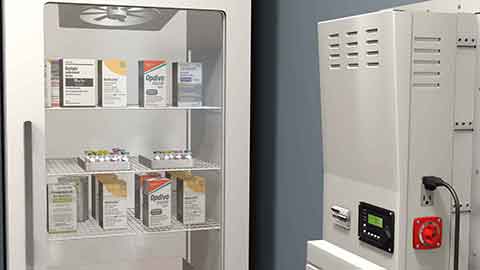Quick Guide to Medical Grade Battery Backup Power Systems
Power isn’t something healthcare providers can afford to gamble with. In medical settings—whether it’s a hospital, pharmacy, lab, or outpatient clinic—the stakes are high. Even a brief power interruption can lead to serious complications, from ruined vaccines to compromised patient care. That’s why medical grade battery backup power systems have become essential—not just for compliance, but for real peace of mind.
When people think of emergency power, they often picture diesel generators. But for many medical applications, generators alone aren’t the right fit. They're loud, require ventilation and maintenance, and often come with a delay before they kick in. In contrast, medical-grade battery systems offer clean, instant, and quiet power. They're built to keep critical systems running smoothly the moment the grid goes down.
More Than Just a Backup
Medical environments depend on precision. Tools and devices used in these settings are often sensitive to power surges or interruptions. A typical consumer UPS might provide short-term support for a desktop computer, but it’s not designed for the continuous, clean power that life-saving medical equipment needs.
That’s where medical-grade systems stand apart. These units are engineered specifically for healthcare settings. They supply uninterrupted power, run quietly, and meet stringent standards for performance and reliability. Some are even designed with built-in monitoring features that alert staff if something’s off—before it becomes a problem.
Where They're Used—and Why
The range of equipment that benefits from battery backup is broader than most people realize. Of course, there are the obvious candidates: vaccine refrigerators, lab freezers, ventilators, and surgical tools. But backup systems are also commonly used with infusion pumps, CPAP machines, incubators, blood analyzers, and even lighting in critical areas.
In pharmacies, just a 30-minute outage can result in spoiled medications or vaccines. In a lab, a sudden shutdown of processing equipment might ruin hours—or even days—of work. And in patient care areas, uninterrupted power is essential to safety.
Some facilities use battery backups as a stopgap while waiting for a generator to kick in. Others rely on them for full coverage during short-term outages. Either way, the point is the same: continuity.
How to Choose the Right System
When selecting a battery backup, two things matter most: the total power demand (load) and how long that power needs to last (runtime). Understanding your equipment’s energy use is the first step. A freezer might draw a few hundred watts; a larger analyzer or imaging system could require much more.
Battery capacity is measured in kilowatt-hours (kWh). If a system is rated at 2.0 kWh, it could theoretically power a 1,000-watt load for about two hours. In real-world conditions, it’s smart to some headroom.
Another consideration is location. Will the unit be placed in a patient room, a sterile lab, or a noisy equipment closet? Some models are designed to be ultra-quiet and compact, while others prioritize capacity over aesthetics.
Ongoing Maintenance and Monitoring
Battery backups are far easier to maintain than generators. Apart from periodic testing to make sure everything is working as expected, there isn’t much else that a user needs to do.
Many healthcare facilities also keep logs for compliance purposes. For instance, in vaccine storage, the CDC recommends continuous temperature monitoring—and backup systems that support those tools. A smart backup solution should integrate seamlessly with the rest of your operations.
Meeting the Standards
Powering medical equipment comes with a layer of regulatory responsibility. Depending on your setting, you may need to comply with safety certifications, CDC guidelines, or even FDA-adjacent standards for specific types of equipment.
Facilities that store vaccines, for example, must follow CDC requirements that mandate emergency power for storage units and monitoring systems. Hospitals are often bound by more complex codes under NFPA or state-level health regulations. The key is working with a vendor who understands these frameworks and can guide you accordingly.
Questions to Consider When Choosing a Backup System:
- Which equipment absolutely can’t lose power?
- How long do you need coverage during an outage?
- Do you require silent operation?
- Will the system need to be monitored remotely?
- What certifications or codes must it meet?
Final Thoughts
Power outages aren’t just inconvenient in medical settings—they could jeopardize patient safety and cause large financial losses to your business. But with the right battery backup in place, your team can continue working without missing a beat. Whether it’s protecting a fridge full of vaccines, keeping a critical lab test running, or ensuring a surgical room stays online, medical-grade systems offer the reliability healthcare professionals need.
At Medi-Products, we’ve worked with providers of all sizes to help them stay prepared. Our systems are built specifically for the medical industry, designed to meet your operational needs and exceed regulatory expectations.
When the lights go out, your backup power system should already be doing its job—silently, reliably, protecting your patients and your business.


